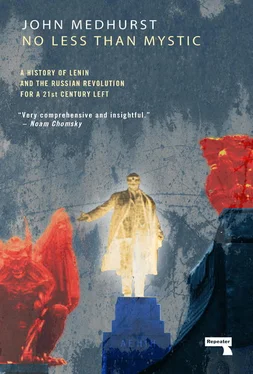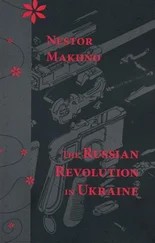Throughout 1920 the Mensheviks were allowed to hold meetings and print newspapers–in May a British Labour Party delegation to Soviet Russia was allowed to talk to leading Mensheviks and even attend their Central Committee meeting–but this freedom was constantly impinged. Their offices were frequently raided by the Cheka and their officials arrested. Their last industrial stronghold, the Moscow Branch of the Printers Union, was slowly squeezed into submission. When the British delegation visited Moscow, the board of the union exploited the brief slackening of control to call a “General Meeting” of printers, at which the union leader Kefali launched a blistering attack on the government. Far worse, the board arranged for SR leader Victor Chernov–a wanted fugitive–to come out of hiding and address the mass meeting. He received a rapturous welcome. Although the Cheka descended and many members of the board were arrested, the print shops remained covert Menshevik sympathisers well into the 1920s.
The Eighth All-Russian Soviet Congress of December 1920 was the last that Mensheviks were allowed to officially attend, and even then they were denied voting rights. Dan told the congress that with the stifling of popular initiative, “the whole system of Soviet democracy has ceased to function except as a mere façade for one-party dictatorship”. 18The brief opening to a “socialist opposition” promised in late 1918 had slammed shut. The debate between Martov and Zinoviev at Halle therefore represented two different philosophies of socialism and democracy. As Ben Lewis says in his invaluable study of Halle, “It was here, in the furor of partisan cheering and electrifying speeches, cut and thrust polemics and killer points, that the fate of the German, and perhaps the International workers’ movement, was fought out”. 19
Zinoviev began by attacking his opponents for propping up the bourgeois order. “Who is saving the bourgeoisie?” he asked. “The so-called social democrats!” He excoriated Millerand in France, Branting in Sweden and Modigliani in Italy as betrayers of revolutionary socialists who would have overthrown capitalism if not sabotaged by parliamentary maneuvers. By contrast, he said, “The International does not wish to be anything else but the leader of world revolution”. He admitted the struggle to create socialism in a shattered war-torn country had been more difficult than the Bolsheviks had imagined:
Previously we studied socialism in books. We thought it could come about more easily. We had spoken of the concentration of capital, of the development of the productive forces. Everything would go forwards; electricity, nice houses etc. We thought we could bring the bourgeoisie to its knees through one strike and that everything would fall into our laps […] Now, comrades, it hasn’t turned out like this, history is taking other paths.
Having gained sympathy for an honest admission of difficulties, Zinoviev, knowing the USPD had arisen from the work of the Zimmerwald Union, compared the new Comintern to Zimmerwald and suggested that from these beginnings grew real revolutionary change. He finished by rejecting the theoretical version of the Dictatorship of the Proletariat in the SPD’s Erfurt Programme, and asked, “But we want you to tell us whether you are for the Dictatorship of the Proletariat in the actual, real sense–already initiated by the German working class in the January Days and by the Hungarian working class”. If so, Zinoviev offered the USPD and the KPD and other Marxist groupings a place in a “United Communist Party” fighting for proletarian revolution within the Comintern. 20It was a spectacular, seductive prospect.
Martov replied the next day. He attacked Zinoviev’s contention that the choice before the Congress was that between revolution and reform. He told the delegates:
Communist Bolshevism attempts in demagogic fashion to take advantage of the masses’ feelings of despair and their elemental indignation, in order to arrive at social revolution at top speed. If the reformist faith, knocked to pieces by the war, manages to be reborn among the worker masses of Europe and America, due to a series of heavy defeats for the proletariat–for example, Finland, Hungary, Bavaria–the entire historical responsibility will be borne by Bolshevism.
He asserted that “the Third International was formed to unify a series of communist parties and sects around the Russian Soviet state”. He asked the USPD to assess the record of that state:
The question is not whether the repression of the Soviet government is a response to the counter-revolutionary actions of its enemies. Rather, the question is this: is it permissible for a socialist party to apply terror, that is, a policy of inspiring fear […] by the indiscriminate murder of the guilty and the innocent?
He laid out starkly the system of mass arrests, prohibition of the press and assembly, regular punishment and imprisonment for strikes, and denial of voting rights in the Soviets. At the close he declared:
Someday the time will come when it will be acknowledged that the highest glory of the Russian proletariat is the fact that, in a time when a utopian psychosis of a completely religious type dominates the socially backward masses, when anyone who dares a word of criticism risks lynching, when so many professional politicians, of the sort well known to you, bravely keep their mouths shut […] there will still be found in Russia simple workers who have gone through years in Tsarist prisons, who are fathers of families, who, despite everything, despite the unheard-of measures of repression, will use Marxist methods to counter-balance the utopian madness and who have one answer to the terrorist threats: such is my conviction and I can do no other. 21
The result of the vote was never really in doubt. The Bolsheviks and their sympathisers in the USPD and KPD were far better organised than their opponents. Zinoviev came wrapped in the romantic mythology of a socialist revolution fighting for its life against White armies and imperialist intervention. And although Martov himself argued for a new International, shorn of the Second International’s social patriotism, that alternative did not actually exist. The Third International did. For these reasons the vote was 234 for a merger with the KPD and affiliation to the Comintern, and 158 against. When the result was announced the minority walked out and the USPD split down the middle.
The result appeared a clear triumph for Bolshevism over Menshevism, but it was a pyrrhic victory. It divided the largest radical socialist party of Germany and weakened both sides. On one side stood the new United Communist Party of Germany with its affiliation to the Comintern, whose political strategies led ultimately to the catastrophe of 1933 and Hitler’s destruction of the entire German left. On the other the remains of the USPD rejoined the SPD and thus lost the radicalism that had distinguished it from its tired, morally compromised parent. Martov’s “third way”–rejection of sectarian Leninism and formation of a new International not beholden to Moscow–was a road never taken.
The lamentable record of the SPD throughout the 1920s led to the eventual fall of the Weimar Republic. But the new German Communist Party played a role in driving the SPD down this road. In March 1921 it called a General Strike across Germany known as the “March Action”. The KPD called for workers to arm themselves. Its daily paper’s headline was, “Who is not with us is against us!” Excited by Zinoviev’s rhetoric and the vision of October, it assumed mass working-class support which did not exist. Chris Harman’s history of Germany in the crucial years from 1918 to 1923 admits that “the Communist Party leadership completely misjudged what was happening”, and that “the class would not move”. 22
Читать дальше












